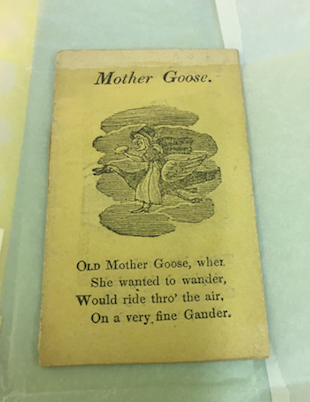Amongst the many treasures that SELCIE have unearthed, there are a number of chapbooks. These pieces are often small in size and volume, usually up to 6×4 inches, having only a small number of pages. However, one must be careful not to be fooled by their superficial appearance. They are highly important owing to their multi-faceted great socio-political significance.
Their measurements and number of pages go some way to illustrating this important facet. The controlled costs of creating and printing these works guaranteed that the sale price of these texts were such that the average man, woman or child on the street could afford to purchase them. Put another way, the readership of these writings was expanded from the restricted reach of only the very wealthy; previously, books had been very much confined to the domain of the rich. Paper was an expensive commodity because of the competition for timber, a product for which there was great demand for ships, building, furniture and fires. Wooden furniture, such as writing desks, together with various wooden artefacts often featured in portraits of the wealthy. However, possession of the written word by the general public ensured that democratisation was well on its way to becoming a reality.
Chapbooks often contained abridgements of classic works. These edited versions were simply segments of what was available to the wealthy in its entirety. Nevertheless, it is the action of reading that is the important aspect to note here: namely, reading was no longer the preserve of the upper echelons of society and access to culture was likewise available to all. Equality of opportunity appeared on the horizon. The degree to which there is a direct cause and effect between increasing levels of literacy and increasing availability of chapbooks is contentious. Alexander Pope wrote that ‘[a] little learning is a dangerous thing’ (215) and that sentiment holds true for readers also. With a general public that was literate, the ruling classes had newly to contend with a group of people that were less likely to accept the status quo.
Among the vast array of material printed as chapbooks, nursery rhymes featured prominently. In our exhibition later this year at the Museum of Childhood, ‘Mother Goose’ will be presented as one such example of the genre. While such a text does not seem at first glance to have the capacity to set the world ablaze with revolutionary change, it is clear that nursery rhymes are socio-political by their very nature. They can and often do impart a moralising gloss. In point of fact, the reader of works such as ‘Mother Goose’ is one who has learnt to assess other thoughts and opinions and thus to re-examine one’s own ideas and attitudes.
Aristotle said that ‘man is by nature a political animal’ (10) and a chapbook upon which a common nursery rhyme is printed testifies to the validity of this idea.

References
Aristotle. Poetics (New York, NY: Oxford University Press, 1995). Print.
Pope, Alexander. ‘An Essay on Criticism,’ in ‘Essay on Man’ and other Poems (New York, NY: Oxford University Press, 2008). Print.
This post was written by Niamh



This is another fascinating article in your blog that i enjoy following. I was wondering where is your collection of chapbooks housed? also what are the rough extent of dates and the number? thanks very much, jacqui Reid-walsh
I am not sure about the number of chapbooks specifically. Sarah estimates about 50. There are some from late 18th century but they are predominantly from 19th century. A good number of them were published in Edinburgh and Glasgow. The archive (located in the City Chambers of Edinburgh) has about 11,000 books in total. Our oldest book dates from 16th century and the collection runs all the way to present day.
I do hope you can make it over to see our up and coming exhibition.